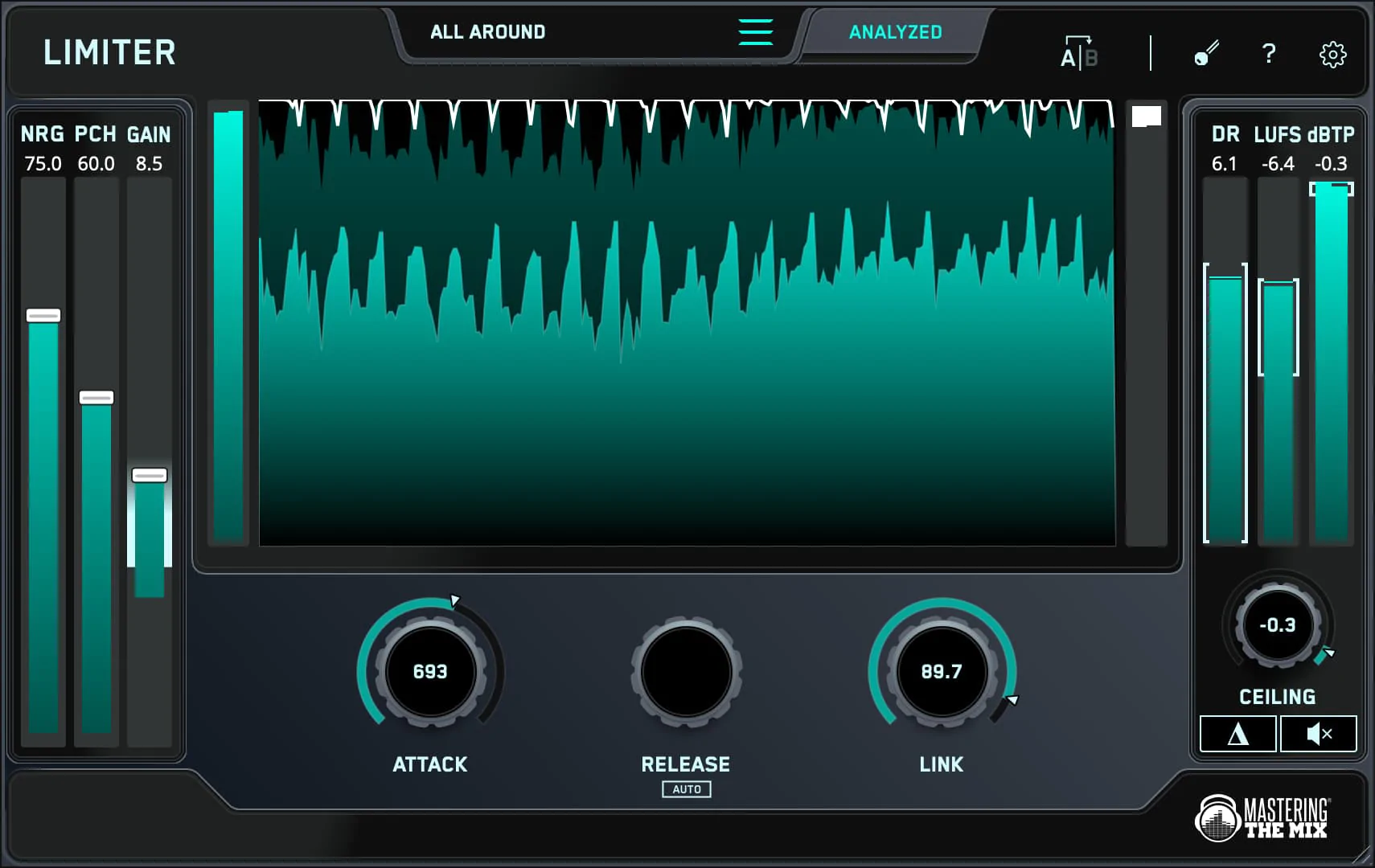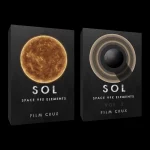Mastering The Mix Bundle v2.0m
Introducing LIMITER. A great-sounding, smart mastering plugin that analyzes your music and suggests the best settings to help you get pro-sounding results. LIMITER’s targets help you optimize the loudness and controls to maximize transparency, minimize distortion, and get the perfect loudness. LIMITER helps you master your music in a smart and musical way whether you’re shooting for a super-loud and punchy master, or optimizing your audio for streaming. LIMITER analyzes your music and gives you targets to help you dial in the best settings and an excellent sound when mastering. LIMITER’s targets help you get a great starting point, from there you can tweak the settings to suit your music and preferences.
QUICKSTART
LIMITER’s primary function is to go on your output channel and help you optimize the loudness and various settings to get your master sounding great and ready for release.
SONIC PERFORMANCE
Transparent Sound
– LIMITER gives your masters dramatically improved clarity in the low-end compared to other limiters.
– When running a 100Hz sine wave through LIMITER, a market leading limiter, and a €299 limiter, we can see that Mastering The Mix’s LIMITER produces considerably less harmonic distortion. In this test the harmonic distortion was 20dB to 40dB less, giving an audibly cleaner sound.
True Peak Control
The ceiling gives you precise control over the true peak of your audio. Even when pushing the loudness to extreme levels, LIMITER keeps your true peaks in check.
INPUT GAIN:
On the left side of the interface you’ll notice three input sliders. For clean gain, adjust the Gain slider to match the target or to suit your preference. The white input gain target will show once analysis is complete and relates to the loudness suggestion of the selected preset. Monitor the loudest section of your track during analysis, as the targets help you optimize the maximum short-term loudness of your track. Adjust the gain slider to sit anywhere within the target range.
– The input gain target is linked to the attack setting. The shorter the attack, the more it reduces the gain. To compensate, the gain target increases as the attack is shortened.
NRG & PCH:
– If you feel the track needs more energy and perceived loudness, increase the NRG slider to drive the sound with’ harmonic distortion input gain (which we created specifically for mastering applications).
– If you feel your track needs punchier transients, increase the PCH slider. LIMITERS unique intelligent transient detection algorithm will musically enhance the punchy elements of your mix.
– If you adjust NRG or PCH after analysis this will have changed your gain level. Click the analysis button again to reset the target range on the clean gain slider. You can even add negative clean gain if necessary.
Attack:
– The attack time (measured in milliseconds) represents the time after which the release of the gain reduction sets in. A longer attack time preserves more transients but may cause audible distortion if the gain is pushed to extreme settings. A short attack time ensures less distortion but the overall loudness of the signal and presence of transients may decrease.
– After clicking the analysis button, you’ll see an arrow on the attack knob. LIMITER analyzes your audio and suggests a musical attack setting that helps to control peaks whilst also keeping your sound punchy and dynamic.
Release:
The release time (measured in milliseconds) controls how quickly the gain reduction returns to zero after the signal is limited. A long release time will make the limiting process smooth but can lead to pumping effects, since the short-term loudness changes may become audible. A short release time helps to preserve transients and to increase the overall loudness of the signal, but it might cause audible distortion at extreme settings.
Auto Release:
To enable intelligent auto release, click the “AUTO” button below the release knob. If auto release is enabled, the release time adapts itself to the characteristics of the input signal and automatically changes based on your audio. This adaptive release time ensures a smooth limiting process even when you go for more extreme gain settings.
– We recommend leaving the AUTO release engaged for the most musical results as AUTO Release is constantly adapting to your music. AUTO Release is automatically enabled after audio analysis.
Ceiling:
Ceiling is comparable to the threshold of a compressor, with the difference being that no audio goes above the ceiling. This allows you to set the headroom, which is the space between the loudest peak of the music and 0dBFS, and account for any intersample peaks introduced by limiting.
Metering
To the right of the interface, you’ll see the DR, LUFS and dBTP meters.
– The DR (Dynamic Range) meter measures how transient your audio is. The higher the number the less transient your music is. Keeping an eye on the dynamic range reading helps you avoid squashing the transients of your audio through over-compression or over-limiting.
True Peak Limiting
LIMITER uses true peak limiting to control intersample peaks and measure true peaks. True Peak Limiting is turned on by default and can be switched off in settings. True Peak limiting does not perform any sample rate conversion on your output audio.
Oversampling
LIMITER only the uses the difference of the oversampled signal to mitigate any loss of transparency due to sample rate conversion. In most cases unless NRG or PCH is used we recommend not using oversampling.
LEVEL DISPLAY
The real-time moving level display shows you how the limiter is affecting your audio. It shows input (light green), output (dark green), and gain reduction (white). You can change the scale of the level display in settings to 30dB, 20dB or 10dB. The level display can also be turned off in settings.
DELTA
As with all things in audio, you want to be sure all processing has a positive effect on your mix and is getting you closer to your desired sound. You can click the Delta button to solo how LIMITER is affecting your mix.
Included:
LIMITER v1.0.2
ANIMATE v1.1.7
RESO v1.0.5
MIXROOM v1.0.9
BASSROOM v1.0.8
REFERENCE v2.0.5
EXPOSE v2.0.5
LEVELS v2.0.3
Homepage:-https://www.masteringthemix.com/pages/limiter-manual




![Sean Divine Vocal Chains SR v1.8 [UPDATED]](https://www.goaudio.net/wp-content/uploads/2025/10/Divine-Mixing-Vocal-Chains-SR-Updated-Box-Render-150x150.webp)



![Toontrack LATEST MIDI PACK [APRIL 2025]](https://www.goaudio.net/wp-content/uploads/2025/04/Toontrack-LATEST-MIDI-PACK-APRIL-2025-150x150.png?v=1745120673)
![Toontrack LATEST MIDI PACK [MARCH 2025]](https://www.goaudio.net/wp-content/uploads/2025/03/Toontrack-LATEST-MIDI-PACK-MARCH-2025-150x150.png?v=1743055485)

![Toontrack NEW RELEASED MIDI [FEB 2025]](https://www.goaudio.net/wp-content/uploads/2025/02/gandr-collage-3-150x150.jpg?v=1740710859)

![Toontrack LATEST RELEASES MIDI BUNDLE [DEC 2025]](https://www.goaudio.net/wp-content/uploads/2024/12/toontrck-2024-150x150.png?v=1733532112)




![Toontrack Hollowbody EBX [WIN+MAC]](https://www.goaudio.net/wp-content/uploads/2024/09/Toontrack-Hollowbody-EBX-150x150.png?v=1726103695)
![Toontrack LATEST RELEASES MIDI BUNDLE [SEP 2024]](https://www.goaudio.net/wp-content/uploads/2024/09/gandr-collage-11-150x150.jpg?v=1725764744)
![Blockbuster Sound Sand Dune & Mockingbird [BUNDLE]](https://www.goaudio.net/wp-content/uploads/2024/08/blockbuster-sound--150x150.png?v=1724378090)
![Blockbuster Sound Mermaids Sirens & Horror Pack [BUNDLE]](https://www.goaudio.net/wp-content/uploads/2024/08/Blockbuster-Sound-150x150.png?v=1723854097)







![Initial Audio XO – Heat Up 3 Expansion [WIN+MAC]](https://www.goaudio.net/wp-content/uploads/2022/10/XO-–-Heat-Up-3-Expansion--150x150.png?v=1666064730)


